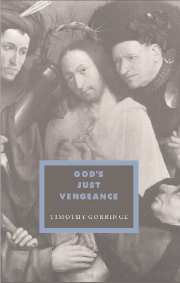Book contents
- Frontmatter
- Contents
- General editors' preface
- Acknowledgements
- List of abbreviations
- 1 Religion and retribution
- PART I THE CULTURAL FORMATION OF ATONEMENT: BIBLICAL SOURCES
- PART II MAKING SATISFACTION: ATONEMENT AND PENALTY 1090–1890
- 4 The ladder of all high designs
- 5 The wounds of Christ
- 6 Three angry letters in a book
- 7 The moral government of the universe
- 8 The age of atonement
- PART III CONTEMPORARY DIRECTIONS IN ATONEMENT AND PENAL THEORY
- Select bibliography
- Index
- CAMBRIDGE STUDIES IN IDEOLOGY AND RELIGION
6 - Three angry letters in a book
Published online by Cambridge University Press: 25 January 2010
- Frontmatter
- Contents
- General editors' preface
- Acknowledgements
- List of abbreviations
- 1 Religion and retribution
- PART I THE CULTURAL FORMATION OF ATONEMENT: BIBLICAL SOURCES
- PART II MAKING SATISFACTION: ATONEMENT AND PENALTY 1090–1890
- 4 The ladder of all high designs
- 5 The wounds of Christ
- 6 Three angry letters in a book
- 7 The moral government of the universe
- 8 The age of atonement
- PART III CONTEMPORARY DIRECTIONS IN ATONEMENT AND PENAL THEORY
- Select bibliography
- Index
- CAMBRIDGE STUDIES IN IDEOLOGY AND RELIGION
Summary
He died so that the penalty owed by us might be discharged, and he might exempt us from it. But since we all, because we are sinners, were offensive to the judgement of God, in order to stand in our stead, he desired to be arraigned before an earthly judge, and to be condemned by his mouth, so that we might be acquitted before the heavenly tribunal of God.
Genevan catechismNo clear date can be assigned to mark the divide between the medieval and the modern world. Many supposedly crucial markers of the new period, such as naturalism in art, can be found in the mid thirteenth century, and not only in Italy. Nevertheless, profound cultural, political and religious changes marking off the fifteenth and sixteenth centuries can scarcely be denied. Such changes were gradual and uneven, more complete in one place or area than in another, but those in the fifteenth and sixteenth centuries who sensed a decisive quickening in the pace of change were not wrong.
Perhaps the single most important change was the growth of the nation state, henceforth the framework for all forms of cultural and political development. Beginning in France, the rulers of Europe slowly gained control over internal enemies and secured their frontiers. In some countries, such as Germany and Italy, this happened regionally rather than nationally. This new political configuration was the salvation of Protestantism, which could have been crushed had the Catholic states acted together.
- Type
- Chapter
- Information
- God's Just VengeanceCrime, Violence and the Rhetoric of Salvation, pp. 126 - 155Publisher: Cambridge University PressPrint publication year: 1996



